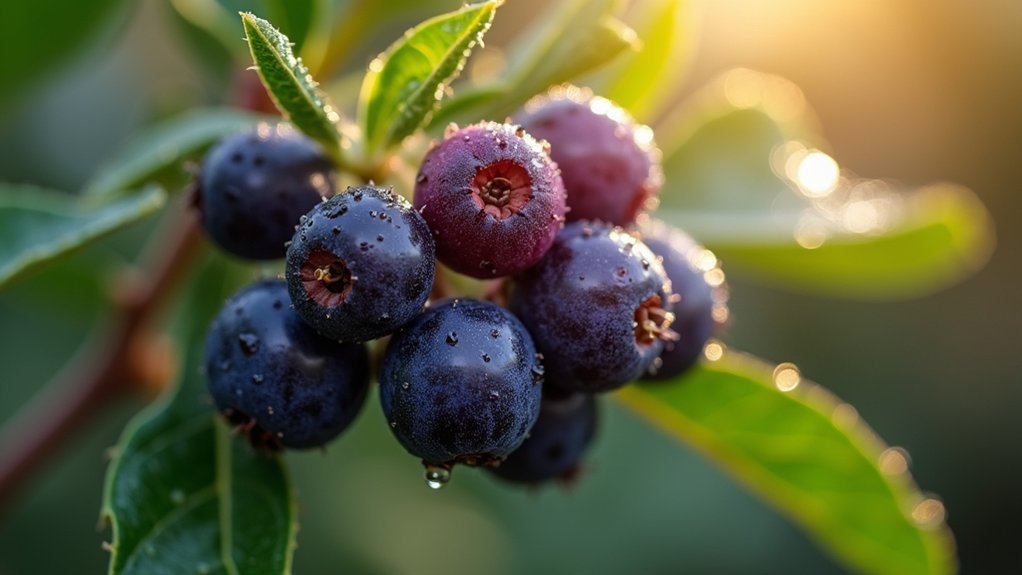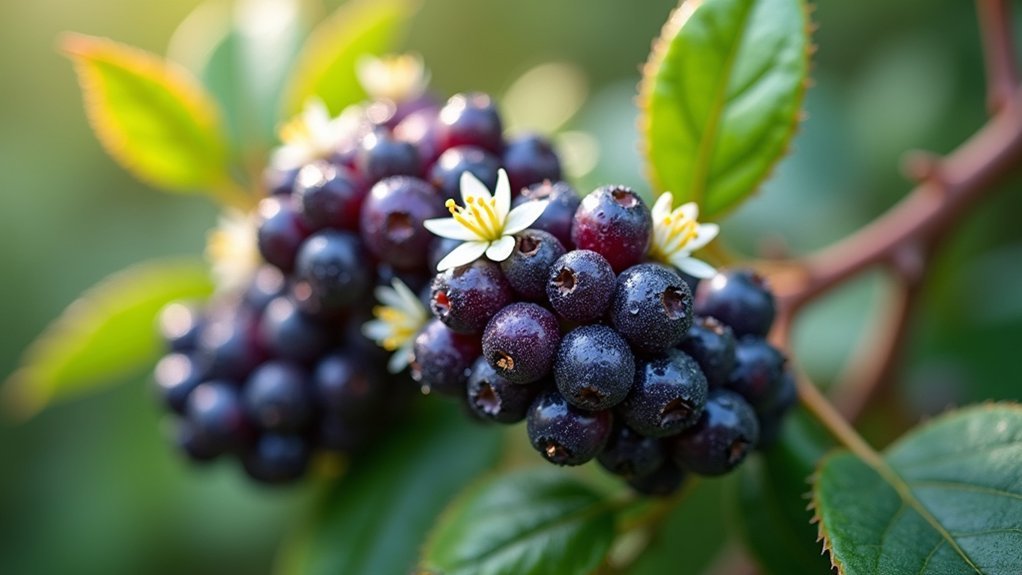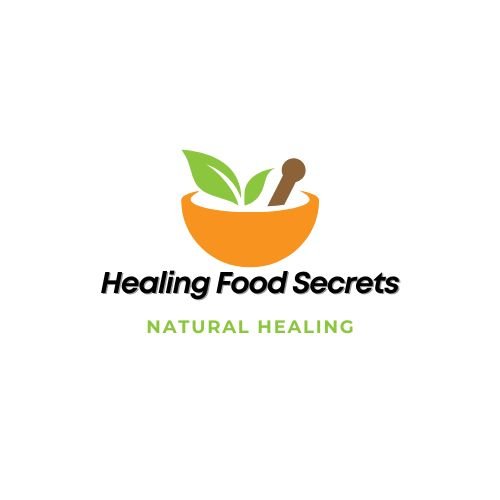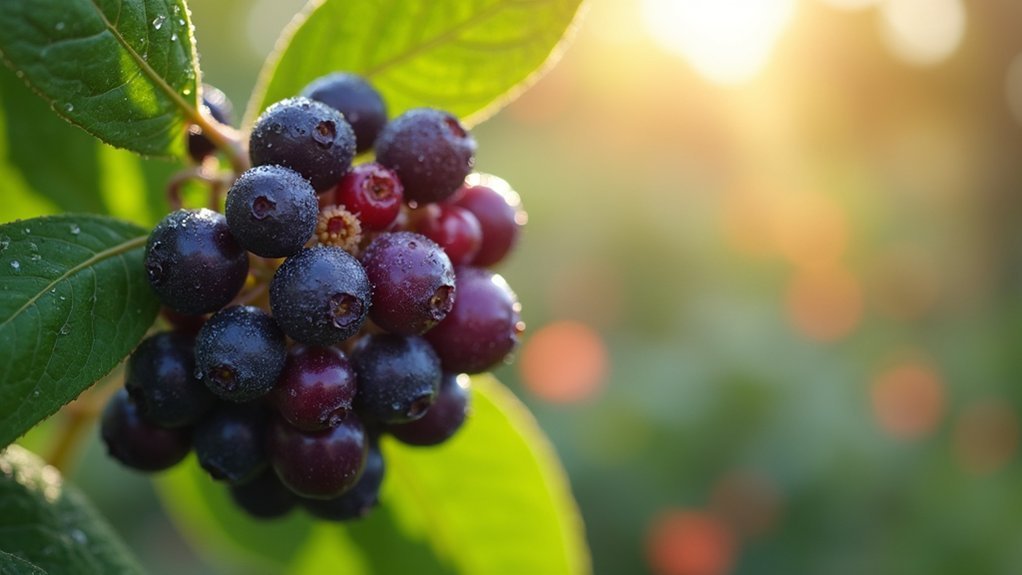Elderberries boost your cellular immune defense through potent anthocyanins that directly block viral entry by binding to viral surface proteins, while simultaneously modulating cytokine production to prevent dangerous immune overactivation. You’ll benefit from their antioxidant power that’s 3.5 times stronger than vitamin E, neutralizing free radicals and protecting cells from oxidative damage. Their prebiotic effects enhance gut bacteria within seven days, strengthening your systemic immunity and creating ideal conditions for your body’s natural defense mechanisms to flourish.
Anthocyanins Block Viral Entry Into Host Cells

When viruses attempt to invade your cells, elderberry anthocyanins act as molecular bodyguards, physically blocking these pathogens before they can establish infection.
These powerful compounds bind directly to viral surface proteins, creating complexes that prevent viruses from attaching to your cell receptors. They’re particularly effective at masking hemagglutinin heads on influenza viruses, disrupting the initial adsorption stage completely.
Your cellular defenses get additional support as anthocyanins interfere with viral entry mechanisms and affect envelope proteins significant for membrane fusion. Unlike synthetic treatments, these natural compounds offer mild side effects while maintaining high biological specificity in their antiviral action.
The OH group at position 3 in cyanidin proves especially essential for this antiviral activity. Research shows dose-dependent inhibition against multiple viruses, including hepatitis C and respiratory pathogens, with effectiveness increasing alongside exposure time and concentration.
Cytokine Regulation Prevents Immune System Overactivation
Your immune system’s cytokine response can be a double-edged sword—while these signaling molecules are essential for fighting infections, excessive production can trigger dangerous inflammatory cascades.
Elderberry’s unique ability to both stimulate and suppress different cytokines helps you maintain balanced immune responses, preventing the overactivation that leads to tissue damage. The bioactive compounds in elderberry, including polyphenols and anthocyanins, exhibit anti-inflammatory properties that work alongside their antiviral effects.
This regulatory mechanism becomes particularly vital in preventing cytokine storms, where your body’s defensive response becomes more harmful than the original threat.
Balanced Cytokine Production
Though elderberries taste pleasantly tart, their most remarkable benefit lies in their ability to fine-tune your immune system’s cytokine production—preventing the dangerous overactivation that can harm your body.
When you consume elderberry extracts, you’re getting powerful anthocyanins and flavonoids that actively modulate your cytokine levels. These compounds reduce pro-inflammatory cytokines like TNF-α and IFN-γ while maintaining ideal immune communication between your cells.
This balanced approach is essential because while you need adequate cytokine production for effective immune defense, excessive release can trigger cytokine storms—particularly dangerous in conditions like COVID-19. Your baseline inflammation state plays a critical role in determining how your body responds to elderberry’s cytokine-modulating effects.
Elderberry’s dual action means it enhances your immune activation when needed while preventing the harmful overproduction that leads to multi-organ damage and severe inflammatory responses.
Anti-Inflammatory Pathway Activation
Beyond simply boosting immune activity, elderberry extract actively orchestrates your body’s anti-inflammatory pathways to prevent the immune system from spiraling into dangerous overactivation.
Your immune system’s response becomes precisely calibrated when elderberry stimulates IL-10 production, an anti-inflammatory cytokine that maintains immune homeostasis and suppresses excessive inflammation. The extract also increases IL-4 secretion, shifting your immune response toward a Th2 phenotype that supports antibody production while reducing harmful cell-mediated inflammation.
This cytokine regulation creates a protective balance that prevents tissue damage from prolonged inflammatory responses. The extract simultaneously reduces TNF-α release in monocytes, further dampening excessive inflammatory cascades that could harm healthy tissue.
Your body’s antioxidative pathways also activate, reducing cellular oxidative stress and stabilizing immune cells. Together, these mechanisms guarantee your immune system responds effectively to threats without causing collateral damage to healthy tissues.
Preventing Cytokine Storms
When your immune system encounters a severe threat, elderberry’s cytokine-regulating properties become essential for preventing the catastrophic overreaction known as a cytokine storm.
During infections, your body can lose control of pro-inflammatory cytokine production, leading to unchecked release of TNF-α, IL-1β, and IL-6. This uncontrolled cascade overwhelms your regulatory mechanisms and causes systemic inflammation.
Elderberry’s compounds help maintain the critical balance between pro-inflammatory and anti-inflammatory cytokines that’s necessary for immune homeostasis. Such regulation is vital because excessive cytokine release can result in cytokine release syndrome, which affects multiple body systems and can become life-threatening without proper intervention.
Antioxidant Properties Neutralize Cellular Free Radicals
Your body’s cells face constant attack from free radicals that can damage DNA and cellular membranes, but elderberry’s powerful anthocyanins provide exceptional protection against this oxidative stress.
These anthocyanins pack 3.5 times the antioxidant power of vitamin E, making them incredibly effective at neutralizing harmful free radicals before they can cause cellular damage. The blue pigments in elderberries specifically target inflammation pathways that can compromise your cellular defenses.
When you’re fighting an infection, this enhanced cellular protection becomes even more vital as your immune system works overtime and generates additional oxidative stress.
Anthocyanins Combat Oxidative Stress
Although your body naturally produces antioxidants to defend against cellular damage, the anthocyanins in elderberries provide powerful reinforcement in this ongoing battle against free radicals. These compounds neutralize reactive oxygen species through hydrogen atom donation, preventing oxidative damage to your cells’ critical components.
| Oxidative Stress Target | Anthocyanin Protection |
|---|---|
| DNA Damage | Prevents genetic material oxidation |
| Protein Degradation | Shields cellular proteins from ROS |
| Lipid Peroxidation | Protects cell membrane integrity |
| Mitochondrial Function | Maintains energy production efficiency |
When you consume elderberries regularly, you’ll boost your plasma antioxidant capacity while reducing oxidative stress biomarkers. The anthocyanins also upregulate your endogenous antioxidant enzymes like superoxide dismutase, creating a thorough defense system that protects your cellular health from oxidative damage. These antioxidant mechanisms operate through both hydrogen atom transfer and single-electron transfer pathways to neutralize harmful free radicals effectively.
Cellular Protection During Infection
During infections, your cells face an unprecedented assault from free radicals generated both by invading pathogens and your body’s own immune response.
Elderberries’ rich flavonoids and polyphenols act as your cellular bodyguards, neutralizing these destructive molecules before they damage your DNA, proteins, and cell membranes. These antioxidants donate electrons to unstable free radicals, stabilizing them and preventing the oxidative stress that weakens your immune defenses.
Your body’s vitamin C stores from elderberries further strengthen this protection while supporting collagen synthesis in epithelial barriers—your first line of defense against pathogens.
The polyphenol content specifically targets inflammatory damage, ensuring your cells remain functional during the immune battle. Research using bone marrow-derived murine dendritic cells demonstrates how elderberry extracts interact with key immune cells to enhance protective responses. This all-encompassing antioxidant shield helps maintain cellular integrity when you need it most.
Gut Microbiome Enhancement Strengthens Systemic Immunity

When you consume elderberry, you’re not just getting immediate immune benefits—you’re also feeding beneficial bacteria in your gut that serve as powerful allies in your body’s defense system.
Elderberry’s anthocyanins act as prebiotics, increasing firmicutes and actinobacteria while reducing harmful bacteroidetes within just seven days. This creates a more diverse microbiome that’s resilient against pathogens and produces beneficial metabolites that enter your bloodstream.
Your enhanced gut bacteria strengthen your intestinal barrier, preventing harmful substances from leaking into circulation and reducing systemic inflammation. Research shows that just 12 ounces daily of elderberry juice can trigger these beneficial gut changes within one week.
This improved gut health directly correlates with better immune function—your body produces more immune cells, develops stronger antibody responses, and maintains higher resistance to infections through powerful gut-immune cross-talk.
Metabolic Improvements Support Immune Cell Energy Requirements
Your immune cells function like high-performance engines that demand consistent, quality fuel to mount effective defenses against pathogens. Elderberry’s metabolic improvements directly support these energy requirements through multiple pathways.
The berries reduce insulin resistance, ensuring stable glucose delivery to immune cells during critical responses. Their polyphenols inhibit digestive enzymes like α-amylase and pancreatic lipase, enhancing nutrient absorption and supporting healthy weight management.
Elderberry’s antioxidants protect immune cells from energy-draining oxidative stress while reducing intracellular reactive oxygen species. The extracts modulate immune metabolism, ensuring proper energy distribution where it’s needed most. Research demonstrates that elderberry’s polar extract effectively corrects hyperglycemia while maintaining stable trace element homeostasis in blood and tissues.
Anti-Inflammatory Compounds Protect Tissues During Infection

While infections trigger necessary inflammatory responses to combat pathogens, excessive inflammation can damage the very tissues your immune system aims to protect.
Elderberries contain powerful anti-inflammatory compounds that help maintain this delicate balance. The flavonoids and anthocyanins in elderberries actively modulate inflammatory cytokines like TNF-alpha, IL-1-alpha, and IL-1-beta, preventing them from reaching damaging levels.
These bioactive compounds work by reducing oxidative stress through their high antioxidant capacity, fundamentally shielding your tissues from inflammation-related damage. One anthocyanin in elderberries demonstrates 3.5 times the antioxidant power of vitamin E, making it exceptionally potent at neutralizing harmful free radicals.
Anthocyanins like cyanidin-3-O-glucoside are particularly effective at defending against infection-induced tissue harm. By preventing cytokine storms and regulating immune responses, elderberry’s anti-inflammatory properties guarantee your immune system fights infections efficiently without causing collateral damage to healthy tissues.
Direct Antiviral Effects Reduce Cellular Damage and Viral Load
Beyond moderating inflammatory responses, elderberries attack viruses directly at the cellular level, creating a powerful defense that reduces both viral load and the damage viruses inflict on your cells.
The flavonoids and polyphenolic compounds in elderberries block viral proteins responsible for attachment, preventing viruses from binding to your cells in the first place. Anthocyanidins, the pigments giving elderberries their deep color, specifically inhibit influenza virus entry and replication.
Elderberry’s lectins add another layer of protection by binding to viral glycoproteins and interfering with virus-host interactions.
This multi-stage inhibition doesn’t just stop initial infection—it continues disrupting viral replication throughout the infection cycle. Elderberry compounds show greater effectiveness at inhibiting viral propagation during later stages of infection. By lowering viral load within your cells, elderberries minimize the cellular damage that would otherwise compromise your immune system’s effectiveness.
Bioactive Compounds Strengthen Cellular Antioxidant Defense Systems
As elderberries defend against viral invasion, their bioactive compounds simultaneously fortify your cells’ internal antioxidant systems, creating a robust shield against the oxidative damage that weakens immune function.
The phenolic compounds, particularly anthocyanins comprising 41.8% of elderberry’s phenolics, act as powerful free radical scavengers while upregulating your body’s own antioxidant enzymes like superoxide dismutase and catalase.
Elderberry’s anthocyanins scavenge harmful free radicals while boosting your cellular production of protective antioxidant enzymes like superoxide dismutase and catalase.
These bioactives activate the Nrf2 signaling pathway, which governs antioxidant gene expression in your immune cells. The nine essential amino acids found in elderberries provide the building blocks necessary for optimal immune protein synthesis and cellular repair mechanisms.
Meanwhile, anthocyanins and flavonoids work synergistically to protect mitochondrial function, preserving the energy metabolism your immune cells need for effective pathogen clearance and sustained immune responses.
- Enhanced enzyme production – Your cells produce more superoxide dismutase and glutathione peroxidase for stronger internal defenses
- Mitochondrial protection – Preserved cellular energy systems maintain immune cell viability and proliferation capacity
- Synergistic antioxidant action – Multiple compounds work together, amplifying protection beyond individual component capabilities
Clinical Evidence Demonstrates Safe Immune Modulation Without Adverse Effects
Clinical trials consistently demonstrate that elderberry supplementation provides targeted immune support without triggering dangerous immune system overactivation.
You’ll benefit from elderberry’s unique ability to modulate your immune response by shifting it toward a balanced Th2 response while regulating cytokine levels. Studies show it reduces inflammatory cytokines like IFN-γ and increases anti-inflammatory cytokines like IL-10, creating ideal immune balance.
Research confirms you can safely use elderberry to reduce cold and flu symptoms by an average of two days without experiencing adverse effects.
The extract’s antiviral and antibacterial properties work through cytokine modulation, decreasing your overall symptom load while enhancing lymphocyte activity. The anthocyanins in elderberry contribute significantly to its potent antioxidant activity and therapeutic effects.
Clinical evidence supports elderberry’s safety profile, showing no overstimulation risks.
Frequently Asked Questions
What Is the Recommended Daily Dosage of Elderberry for Immune Support?
You’ll want 1-2 teaspoons of elderberry syrup daily for maintenance, or 600-1200mg in capsule form. You can increase to four times daily when you need more intensive immune support.
How Long Does It Take to See Immune Benefits From Elderberry?
You’ll typically see immune benefits from elderberry within 10-15 days of consistent daily use. If you’re actively fighting illness, you may notice symptom relief within 4-5 days of starting supplementation.
Can Elderberry Be Taken Safely With Other Immune Supplements or Medications?
You shouldn’t combine elderberry with immunosuppressants like prednisone without consulting your doctor first. It can reduce their effectiveness. Exercise caution with other immune supplements too, as interactions aren’t well-studied.
Are There Any Side Effects or Contraindications for Elderberry Consumption?
You’ll experience nausea, vomiting, and diarrhea if you consume raw elderberries due to cyanogenic glycosides. You shouldn’t take elderberry if you’re pregnant, breastfeeding, or allergic to related plants.
Which Form of Elderberry Is Most Effective: Syrup, Capsules, or Juice?
You’ll find elderberry syrup most effective for quick immune support and flu symptom reduction due to superior bioavailability. However, you can choose capsules for convenience or juice for additional metabolic benefits.
In Summary
You’ll find elderberries provide extensive immune support through multiple cellular mechanisms. Their anthocyanins block viral entry while cytokines prevent immune overactivation. You’re getting powerful antioxidants that neutralize free radicals and enhance your gut microbiome. The metabolic improvements support your immune cells’ energy needs, while anti-inflammatory compounds protect tissues. With direct antiviral effects and proven clinical safety, you’re strengthening your body’s natural defense systems effectively.





Leave a Reply